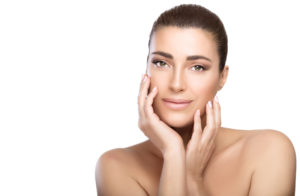
When you’re young and your skin is taut and firm, the last thing you’d probably compare it to is an elastic band. But, as you get older and start to notice various changes in your skin, from wrinkles, sagging, a duller, drier texture, and deep creases, skin elasticity is something that comes up more and more. Part of the skin aging process is having skin lose some of its elasticity. The result is skin that sags or droops where it didn’t before.
So what can you do, if anything, about the loss of skin elasticity? A few options are available for helping to improve your skin’s elasticity, and for keeping your skin firm and supple for as long as possible.
Why Skin Loses Elasticity
Your skin being described as “elastic” when you’re young isn’t an accident. The component of skin that gives it its suppleness and spring is actually known as elastin. Elastin, like collagen, is a type of protein. While collagen is the protein that provides support and structure to your skin, elastin is the protein that lets your skin “bounce” back. It’s stretchy and is a big reason why you don’t end up with dents or divots all over your body when someone pokes you, and why you can puff out your cheeks and have them return to their original size, rather than hanging limp.
As you get older, your body starts to produce less elastin naturally, through a process known as intrinsic aging. A reduction in collagen production and a reduction in oil production are also common signs of intrinsic aging. Everyone’s intrinsic aging clock and rate is slightly different. Some people might start to produce less elastin and collagen much earlier than others, for example.
While a subtle reduction in elastin and collagen production begins in early adulthood, a few things can speed up the process, causing skin to lose its elasticity much more quickly.
The factors that accelerate aging and that aren’t programmed into a person’s genes are known as extrinsic aging. They include things like smoking and spending a lot of time out in the sun without any protection. Exposure to high levels of pollution can also be a cause of extrinsic aging.
How to Jumpstart Elastin Production
Although its protein cousin collagen often gets all of the attention, it’s worth paying attention to elastin as well. In some people, elastin production starts to drop after the teenage years.
While you probably won’t be able to restore your body’s levels of elastin to their pre-teenage days, you can do some things to help increase the amount your skin produces. Using a skincare product that contains retinol, a popular ingredient in both over-the-count and prescription products, can help to encourage the production of elastin, as well as collagen. Retinol also helps your skin other ways, such as by increasing cell turnover and by minimizing the size of pores. It can also help minimize dark spots.
Another way to improve your skin’s elasticity is to focus on keeping it well hydrated. Moisturizing the skin will help to protect it from stress. The less stress your skin experiences, the less likely any remaining elastin is to be affected.
Repairing Sagging Skin
What if your skin is already showing some signs of a loss of elasticity, such as visible sagging? How you repair the sagging depends in part on how noticeable it is. Traditionally, the only option for restoring skin firmness was a surgical procedure, such as a facelift.
Nowadays, non-surgical options can help to tighten loose skin. Ultherapy is one option. It uses ultrasound energy to stimulate collagen production in the dermal layer of skin. Over the course of a few months, the skin becomes tighter and firmer. Visible sagging is reduced.
Usually, Ulthera is recommended for people with mild amounts of sagging. If you have a considerable amount of skin sagging, a surgical procedure might provide better results.
Protecting Your Skin
Often, protecting your skin from extrinsic damage is more valuable than waiting to fix any damage done. If you aren’t in the habit already, start using an sunscreen (at least SPF 30) daily. Reducing the amount of time you spend in the sun can also protect your skin from further damage.
At Mirror Mirror Beauty Boutique in Houston, Texas, Dr. Paul Vitenas and a team of aestheticians can help you decide which treatment is best for your skin. To learn more about the skincare treatments we offer and about how to keep your skin looking firm and smooth for years to come, call 281-810-9083 today.